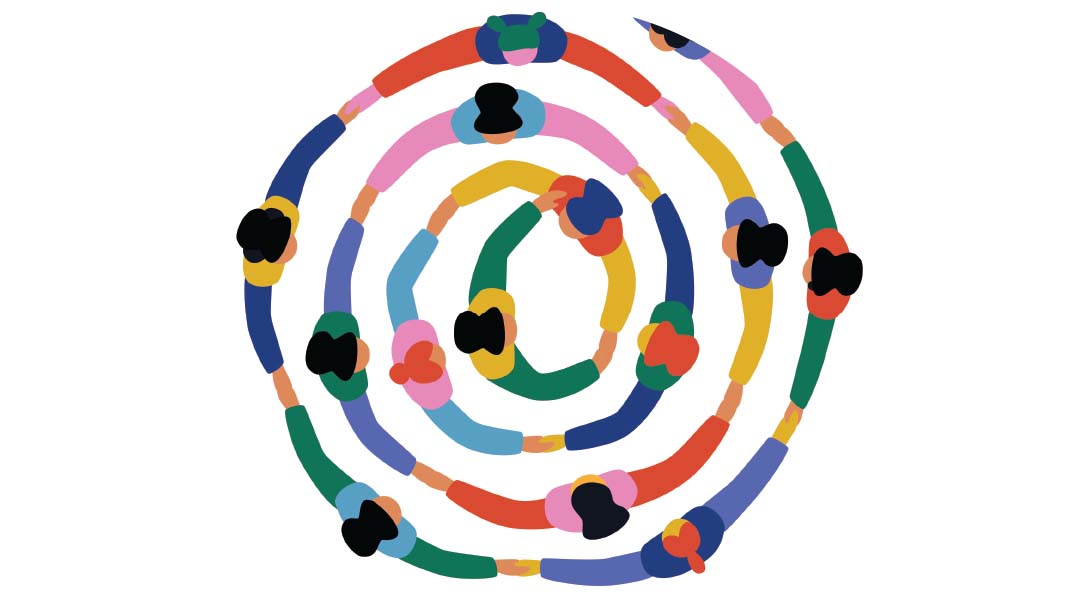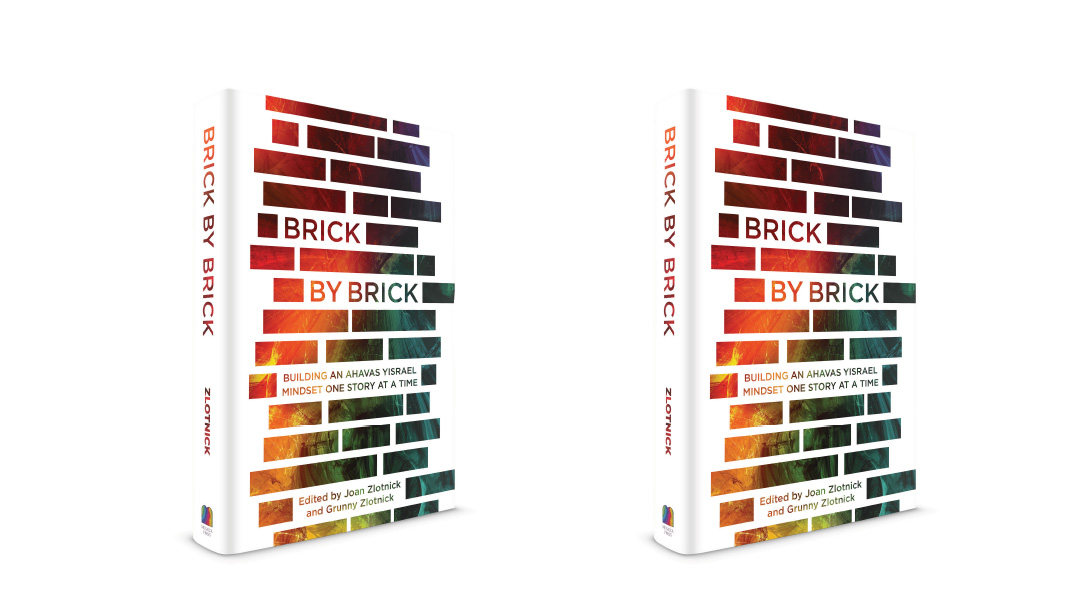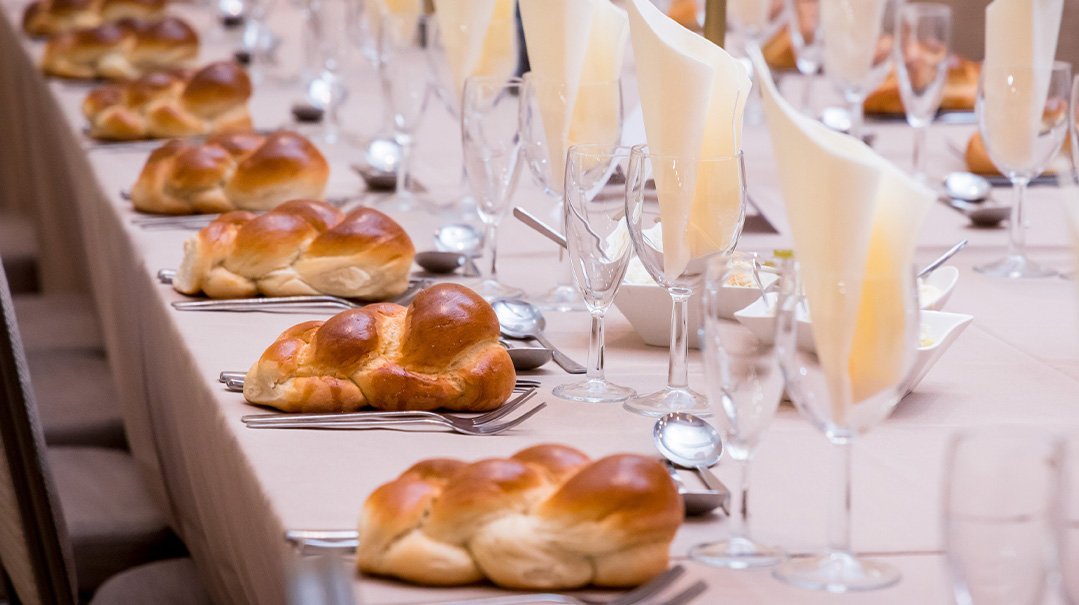Meet Esther Hochstadter

Esther Hochstadter shows prospective Jews what Torah life really looks like

Esther Hochstadter is one of the founders of the Jewish Community Council of Montreal’s Orthodox conversion program. She’s taught and mentored baalei teshuvah as well as women seeking Orthodox conversion for over 30 years.
From the day I graduated Michlalah Jerusalem College back in ’78, I had my heart set on being a teacher. Sporting a dual degree in Tanach — authentic, high-level Torah knowledge — and ESL, I entered the classroom.
I remained in Israel for nine years, during which I studied, got married, had my two oldest kids, and enjoyed the beginnings of my teaching career. Though I loved what I did, I soon realized that raising a bunch of little children needed more of my attention. Add to that a move back to Canada, my home country, and I made a decision to stay out of the classroom for a while.
Hashem had other plans.
Back in Montreal, a fledgling endeavor was underway. A rav in the community asked if I’d learn with one woman, a potential convert, and teach her different Jewish topics, some halachah and hashkafah. The woman was a university graduate, and with my professional background, as well as my eclectic connections with Chabad, Breslov, and the mainstream community, the rav saw me perhaps as being a little out of the box and felt I could work well with her. One student doesn’t sound too threatening, I thought. I said okay.
One student quickly became two, then three, but it was a quiet affair, around my dining room table. When people would ask what I do, I’d simply say “adult Jewish education.” It was too complicated to explain myself all the time.
Feel at Home
Looking back, there was no sudden metamorphosis. In the beginning, it was just me and the rabbanim and a friend of mine who became the administrator. The rabbanim wanted our program to provide an extremely high standard of geirus that would be universally recognized, so they consulted with major authorities in Israel. Together we developed a curriculum and almost simultaneously opened a male division to accommodate the men who wanted to come learn.
Fast forward a few years later. As converts from our nascent program started moving into the neighborhood, people started calling with offers to have guests for Shabbos. Jewish media began featuring the concept of conversion programs as well. Today it’s a common fact in the Jewish world.
In a twist of irony, several years in, I was hosting a baalas teshuvah at my home. I walked her to shul on Shabbos and introduced her, and people were confused at the obviously Sephardic last name; they’d grown so accustomed to seeing me with conversion candidates whose names were often not Jewish sounding. Hey, I also know a few Jews in this town, I wanted to say. But that’s how well-known we’d become, and I was gratified.
No Jew Left Behind
Our program isn’t merely a pedagogic program for conversion candidates; it’s also very much an experiential program that walks its participants through the process. We provide a never-ending stream of panel discussions, shabbatons, Purim, and Chanukah events, and virtual support chats.
Yiddishkeit isn’t something that can be learnt textually; you have to live it. You have to be in people’s homes and absorb the Jewish lifestyle around the clock. That’s why we developed a system of “sponsoring families” who become like extended family to our candidates, as a prerequisite to conversion. They will ensure that no ger will ever convert without having a family, even two or three, who’ve embraced them, who are leading them, and including them in life-cycle events.
Four years ago, when I was visiting Eretz Yisrael, I was invited to give a shiur one Shabbos to a group of women in Yavniel. When the class was over, a young woman came over and said to me, “Esther, I’ve never heard anyone before speak so lovingly about giyoros. I could listen to you forever.”
That young woman happened to be a daughter-in-law of the famed giyores Tzirel Rus Kriger, author of The Mountain Family, who, through our shared dreams, would later become one my closest friends and colleagues.
It was a heartwarming moment, yet her comment ripped me. That night, as my husband and I drove back to Jerusalem, I said to my husband, “What are we going to do about this? How can we change this, make these women feel more supported and connected with each other?” Many of the giyoros who I knew in Eretz Yisrael didn’t have access to smartphones or technology. And so, one of my sons-in-law introduced me to free conference calls — and from there, things blossomed.
When Covid broke out and the virtual world exploded, our weekly phone shiurim to women in Israel suddenly snowballed to include weekly learning sessions for giyoros and baalei teshuvah the world over, from Strasbourg to Singapore.
At the same time, Tzirel Rus and I also launched a monthly newsletter. Two years in, the newsletter still runs, and includes all kinds of timely issues that concern geirim and baalei teshuvah; it offers an array of Torah thoughts and also includes advertisements that are relevant to the geirim/baalei teshuvah community around the world.
Gathering Sparks
The Talmud tells us that part of the reason for our long exile is that we need to gather all those sparks that were at Har Sinai, yet muffled out by the multitudes, and bring them home where they belong. These are the neshamos of the geirei tzedek.
The thirst for connection displayed by the women I’ve come to know over time never ceases to fuel me and humble me. It’s a constant affirmation of what I believe and a never-ending opportunity to spread that belief to people who are truly trying to connect to authentic Judaism.
When I meet with Middle-Eastern women, for example, and they want to convert, I tell them they have a double whammy; not only are they trying to become Jewish, but they’re coming from countries hostile to Jews. I had a student who was from Lebanon; from the age of 17, she was listening to Kol Yisrael on short-wave radio. There was a Hindu girl I’d gotten to know whose parents were threatening to endanger her life. They come anyway.
We screen them for ulterior motives, and have them pass our conversion-readiness assessment — a psychological assessment created by Rabbi Dr. David Fox in partnership with the beis din — at their own cost. And still, they come. And many are raising beautiful frum families today.
These people want emes; they’re fed up with sheker, and watching them transform and give up everything they’ve known, often including their families and financial stability, fires me up. All kinds of people come — often they’re attracted to the community aspect, or they’ve seen Jews in the workplace, or at college. Sometimes they’ll even have Jewish family roots (yes, we’ve seen Marranos too), but the bottom line, inevitably, is they’re weary of searching, of trying to believe stories that never made sense to them.
My kids have been so enriched watching geirim come in and out of our house, the growth, the colors, that today many of them are involved in kiruv as well. They harness their lack of judgement and increased tolerance to continue making a difference in Klal Yisrael.
The most challenging aspect of my work:
Discerning true sincerity. We’re a very giving, generous nation, and sometimes there are people who are lonely or mentally unstable, who are looking for the security of a community, a family, a warm embrace. It’s an ongoing challenge of discernment.
If I could share a single message:
Jewish media does a fantastic job publicizing the stories of the more famous geirim. Yet what about the average person who’s seriously looking for Hashem in her life, who’s not a dancer or a singer or the latest basketball star, but who nevertheless is a most beautiful addition to Klal Yisrael?
As one woman from Tzfas who called into a recent Zoom support group so aptly put it: “I’ve attended many classes on bitachon here in Tzfas, but for me there is no better attestation to bitachon than what I see on this screen today, as these women recall the sacrifices they’ve made and the dedication of their journeys.”
There’s no ger who hasn’t lost friends and close contacts along the way, who hasn’t burned any bridges by not attending funerals or weddings in less-than-appropriate locations. When you bring them into your home, don’t look at them as a story, just embrace them and learn from them. Don’t feel you have to educate, and don’t fear the infiltration of foreign ideas. Hashem isn’t looking at that; He’s looking at their mesirus nefesh and, as children of Avraham and Sarah, is giving them added protection. Focus on that.
Secret dreams:
I dream of walking the streets of Israel and chatting with Jews who are not yet connected with their roots and sharing the beauty of our religion with every single person I meet.
I also dream of writing a book about some of my most fascinating and inspiring experiences, but I can’t stop teaching long enough to write.
(Originally featured in Family First, Issue 779)
Oops! We could not locate your form.






